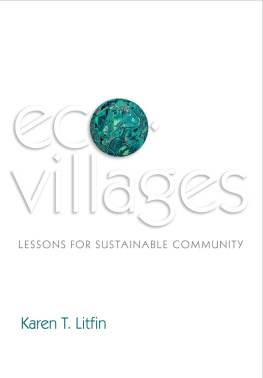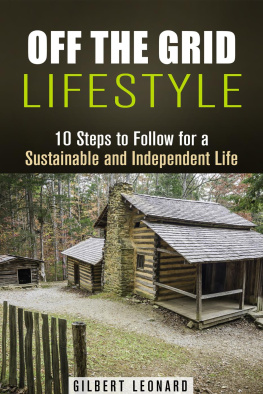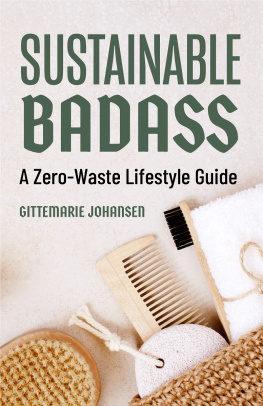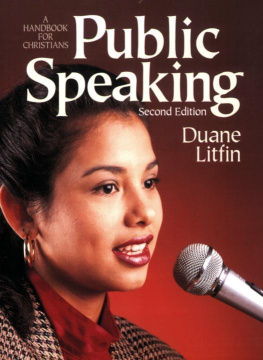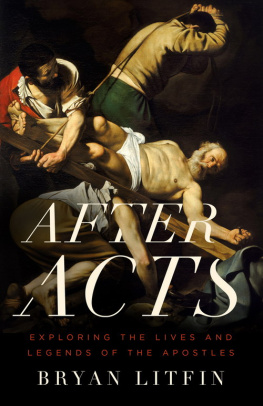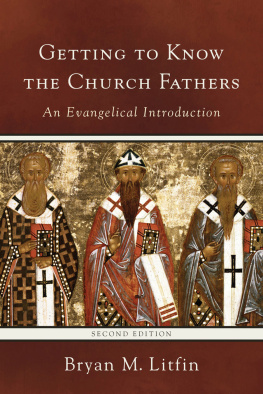ECOVILLAGES
For my teachers
Copyright Kar en T. Litfin 2014
The right of Karen Litfin to be identified as Author of this Work has been asserted in accordance with the UK Copyright, Designs and Patents Act 1988.
First published in 2014 by Polity Press
Polity Press
65 Bridge Street
Cambridge CB2 1UR, UK
Polity Press
350 Main Street
Malden, MA 02148, USA
All rights reserved. Except for the quotation of short passages for the purpose of criticism and review, no part of this publication may be reproduced, stored in a retrieval system, or transmitted, in any form or by any means, electronic, mechanical, photocopying, recording or otherwise, without the prior permission of the publisher.
ISBN-13: 978-0-7456-8123-8
A catalogue record for this book is available from the British Library.
The publisher has used its best endeavours to ensure that the URLs for external websites referred to in this book are correct and active at the time of going to press. However, the publisher has no responsibility for the websites and can make no guarantee that a site will remain live or that the content is or will remain appropriate.
Every effort has been made to trace all copyright holders, but if any have been inadvertently overlooked the publisher will be pleased to include any necessary credits in any subsequent reprint or edition.
For further information on Polity, visit our website: www.politybooks.com
CONTENTS
LIST OF FIGURES
helps to lighten the mood in my classes
An Aurovilian web designer works with clients from his home, a thatch-hut in the forest
A Damanhurian software engineer lives in a tree house
Sieben Lindens Strohpolis incorporates straw-bale construction, passive solar design, and rainwater catchment
EVIs SONG neighborhood demonstrates passive solar and shared-wall design
Findhorns Living Machine recycles the communitys water supply 10,000 gallons on a daily basis
At Konohana, farming supports the community economically while fostering social bonds and spiritual growth
Jiby, my translator, in front of his hand-built mud home in Faoune, the village where Colufifa is headquartered
Lamin Camara stands with me on a hand-carved wooden fishing boat, with the boatbuilder on the left
Damanhurs complementary currency, the credito, fosters prosperity and community solidarity
Local village children enjoy hands-on environmental learning at Aurovilles Aikyam Bilingual School
Music, dance, and ritual are vital to ecovillage culture. Here, Findhorn residents form a human spiral
Damanhurs Hall of Mirrors in the underground Temples of Humankind
painting at Konohana depicts humanity as a baby holding Earths fate in its hands while also being held by the Divine
The enormous banyan tree adjacent to Aurovilles Matrimandir also serves as a sacred space for the community
This tapered-wall wooden yurt, where I wrote this book, was the first new home built at SkyRoot
ACKNOWLEDGMENTS
It has literally taken a planetary village to write this book. First and foremost are the fourteen communities who invited a curious academic to live in their midst and the 140 ecovillagers who gave lengthy interviews. My research was greatly facilitated by the following people who served as community liaisons: Aly Mansare and Mariama Guldagger (Colufifa); Alan Corbett and Max Lindegger (Crystal Waters); Macaco Tamerice (Damanhur); Diana Leafe-Christian (Earthaven): Liz Walker (EcoVillage at Ithaca); Michiyo Furuhashi (Konohana); Lois Arkin (Los Angeles Ecovillage); Bandula Senadeera (Sarvodaya); Kosha Anja Joubert (Sieben Linden); Sigrid Niemer (UfaFabrik); Ina Meyer-Stoll (ZEGG). I also thank Bagnaia, the charming Italian ecovillage where I convalesced while too sick to travel. For consulting with me about the journey, I owe a special debt of gratitude to Jonathan Dawson, Ross and Hildur Jackson, Kosha Anja Joubert, and Diana Leafe-Christian.
Each of the fourteen micro-societies I visited is like a world unto itself, with its own ethos and ambiance. As much as I endeavored to dive deeply into each one, what I could glean in a matter of weeks was necessarily shallow particularly because most interviews required English translation and only a small portion of that has found its way into the book. Moreover, my field is global environmental politics, not community development. Consequently, I have inevitably made mistakes and glossed over important aspects of each community. While a cast of thousands stands behind this book, I alone am responsible for the shortcomings. For these, I apologize with the hope that the overriding transformative message nonetheless shines through.
There were those who facilitated the journey and those who supported the writing. To the extent that you are now holding a lively and accessible book rather than an academic tome, Margaret Bendet is largely responsible. Not only is Margaret, with her keen sense of nuance and authenticity, my favorite writing teacher, but she also became a treasured friend. For our serendipitous Easter meeting at the Whidbey Institute, I thank my friend and colleague Johnny Palka.
To all those who read the manuscript, entirely or in parts, I owe a debt of gratitude: Sarah Ellison, Wendy Visconty, Anya Woestwin, Chris Uhl, Lauran Zmira, Leanne Do, Vicki Robin, Tim Richards, and David Marshak. For research assistance, I thank Mark Visconty, Julie Johnson, and David Wilkerson. For help with the index, I thank Catherine Quinn and Angela Gaffney. My thanks also to Stephen Dunne for computer assistance. I am especially grateful to my dear friend Donna Gregory for enlivening the early chapters and offering wise counsel throughout. For bringing this book to fruition, I thank my editorial team at Polity, especially Louise Knight, Pascal Porcheron, Clare Ansell, and Gail Ferguson. They have shepherded the project with good humor and the greatest of care.
To have the freedom to write this book a highly personal seven-year project is a great privilege. I acknowledge the Department of Political Science at the University of Washington for enabling this unconventional international relations scholar to fully engage her academic freedom. In particular, my sincere thanks go out to my chair Peter May and my colleagues Jamie Mayerfeld and Christine DiStefano for their encouragement, and to Aseem Prakash for challenging me to scale it up.
For helping me to begin thinking of myself as a writer, I thank the Mesa Refuge for a residency in a lovely cottage overlooking Tomales Bay. I will never forget the day the agricultural levees came down and the Pacific Ocean trickled up the tributaries, bringing new life to an old wetland. It was the perfect metaphor for this book. My thanks, as well, to Carroll Smith and Janice Giteck for their Whidbey Island guest cottage, where I organized more than two thousand pages of research notes.
This book would not have been possible without the loving support of my friends and family. I am especially grateful to Rand Hicks for grasping and emboldening my larger vision; to my dearest friend, Anya Woestwin, who sees my higher self and always finds a larger framework for the rest; to my daughter, Maya Jacobs, who inspires me every day and loves me no matter what; and to my mother, Kathleen Wilkinson, who believed in me even when she couldnt understand me. And theres no question that my journey was inspired by Laura, who lived the possibility and sent me on my way.

